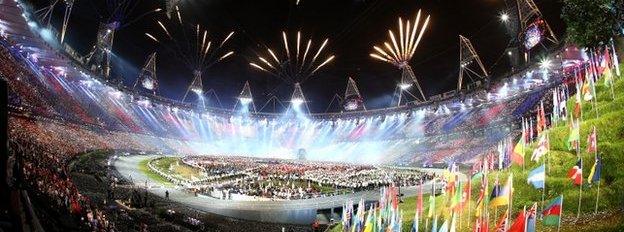Is London good or bad for Scotland?
- Published

Olympic host London is the epicentre of world sport, for two weeks at least
It's one of Scotland's most important relationships. In politics, viewed from Scotland, it hovers somewhere between being the dominant issue and an obsession.
But what about business, and about the economy? Is London good or bad for Scotland?
It's a question I've been mulling for the Business Scotland programme on BBC Radio Scotland this weekend.
It's been provoked for me by the focus on London for the Olympic Games, both in capital spend on the infrastructure of the Games, and now as the epicentre of world sport, at least for two weeks.
Of course, the magnetic appeal of London is nothing new. But in speaking about it to a wide variety of people over a long time, I find it's a relationship that's often treated as part of Scotland's business furniture.
It's obvious that London is a big and powerful global city. For many businesses, it's where their customers are. It's the home of regulators and the dominant source of finance.
It's also where foreign investors often start looking for somewhere in the UK to invest. In running a temporary Scotland House on Pall Mall for two weeks, the Scottish government's economic agencies hope to get 400 such investors through the door.
Congested
But then, its airports - and one overstretched one in particular - are all too often where Scots have to travel, if they can get a connection, to link with the world.
The south-east's oft congested roads are the gateways and conduits through which many Scottish imports and exports travel. It's said that of all the traffic congestion afflicting the Scottish economy, London's M25 ring road is by the far the worst.
London's not only where political power is wielded, but it's where cultural power is focused too - as a melting pot of cultural ideas and identities and at the business end of culture, from publishing to West End theatre to the BBC London headquarters.
In economic terms, it offers the spread effect, spinning out opportunities for doing business, and for reaching critical mass that doesn't exist in purely Scottish or more regional markets.
Magnetic
But it also brings the shadow effect, making it difficult for others to grow while it exercises such a powerful magnetic role.
One such magnet is for headquarters. Companies outside London seem particularly vulnerable to takeover by those in much bigger centres. It's not only Scotland that's seen a sharp reduction in the number of listed companies with headquarters. Other parts of the UK have done likewise.
And then there's the drain of talent. For the radio programme, David Stenhouse, who wrote 'On the Make' about Scots in London, said Scotland has always produced more graduates than it needed. For some, the road south is the only high road.
Stenhouse points out a pattern of economic cycles. The Scots who came to dominate London government, politics, many areas of business and also media were from a generation who left education in the 1980s, looked around, saw little opportunity, and got out.
He argues that pattern keeps repeating - a downturn pushes talent to seek opportunity elsewhere, and then two to three decades later, the Scots are running the show down south. In the case of Gordon Brown's prime ministership, it brought precisely the same hostility from Londoners that Scots first found when James VI first took his court there.
Over-heated
Improved transport connections, whatever the continuing shortcomings, increasingly allow for people to operate as WILLIEs: working in London, living in Edinburgh.
And the talent drain can be reversed. As Keith Skeoch of Standard Life Investments told me, the quality of life outside London helps him recruit, not only from London, but other global cities. It's a small but telling thing, he says, that top flight financiers can get home in the afternoon to see their children playing school sports, and get back to their desks within minutes. That would require a day off in London, as well as a lengthy commute each day.
Professor Duncan MacLennan, an economic geographer at St Andrews University, says we need to see London as more than a place with buildings and institutions. A well-functioning global city is a series of connections. They're there to be exploited.
But he also argues that Britain has done badly at spreading the benefits of London. Regional policy has had its successes, but it's been inconsistent, and it's also had its failures.
Economic change in recent decades has made London less reliant on other parts of the UK, and now cities such as Leeds, or Glasgow, look to the spin-out effects of the overheated London financial sector.
Much of England has become a hinterland for the global city. One of the curiosities of British politics, at least from a Scottish point of view, is how little the dominance of London shapes the politics of the English regions.
That said, MacLennan praises Manchester as the premier example of a city that created a distinct and more independent pole. It may not rival London, but its airport and urban transport strategies, while attracting big institutions such as the BBC in Salford, are helping Greater Manchester define itself independently of its capital.
What Britain has done least well, particularly when compared with its near neighbours, is use transport to spread the benefits. The lack of high-speed rail, and the congestion on the east and west coast lines that we already have, are a brake on spreading growth.
But then, would high speed rail really move growth out, or would it make the whole country into Greater London's commuter belt?
You can hear Business Scotland on BBC Radio Scotland at 10.05 on Sunday 4 August, and again by free download.